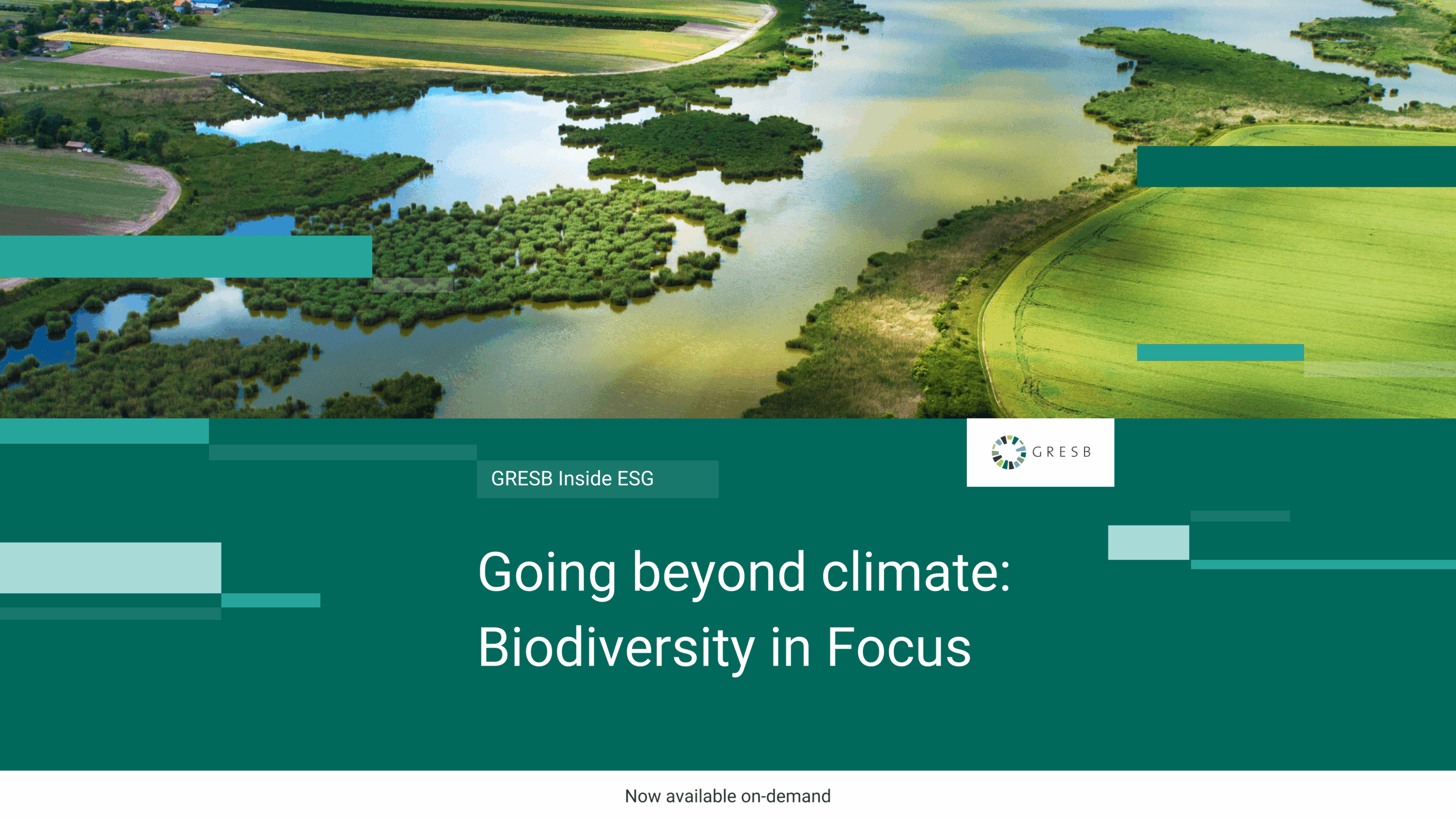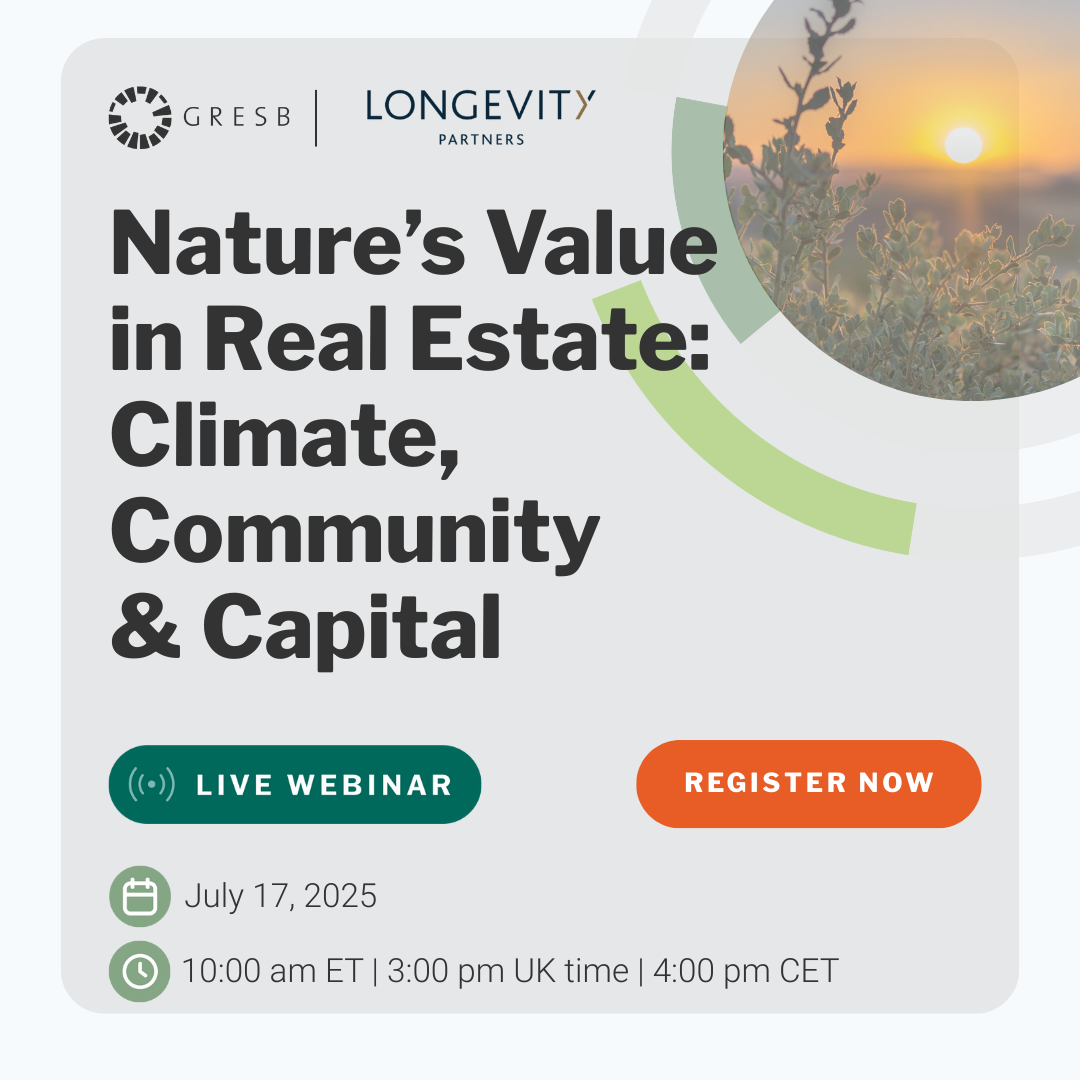Biodiversity and natural capital have rapidly emerged as key considerations in responsible investment, echoing the urgency that climate-related issues commanded in recent years. As disclosure requirements and reporting standards for biodiversity gain traction and their adoption and relevance are discussed across the industry, there remains a sense of uncertainty among many market participants about how to effectively engage with this evolving topic and how to identify the direction of travel.
The GRESB Foundation, the independent, industry-led body that owns and develops the GRESB Standards, is committed to maintaining a forward-looking approach and helping GRESB Members in effectively incorporating biodiversity considerations into their strategies, ensuring they are well-prepared to meet the challenges of this rapidly evolving area.
Recognizing the Taskforce on Nature-related Financial Disclosures (TNFD) framework as a key driver of biodiversity-related discussions among real asset investors, the GRESB Foundation first included biodiversity as a topic for discussion in the Standards development process in 2024.
This article will provide insight into GRESB’s efforts to respond to this mandate and to incorporate biodiversity into the GRESB Standards and products in the longer term, as well as provide support for investors and companies in understanding and managing their nature-related risks and opportunities effectively.
Biodiversity initiatives
Following the mandate from the Foundation last year, GRESB focused on active engagement and alignment with the industry and framework developers. Some of the most notable activities from 2024 on this topic include:

In July 2024, GRESB hosted a biodiversity-focused webinar during which Sarah Welton, Director of the GRESB Foundation, engaged in a discussion with Lizzie Adams from Goldman Sachs AM and Hing King Lee from NextEnergy Group—both organizations are early adopters of TNFD and GRESB Members—to understand market implications and opportunities linked to the release of TNFD Recommendations and other framework and regulatory developments.
The webinar shared real-world perspectives on how market participants navigate their daily operations with the new commitments in place. The experts shared their experience and recommendations on the first steps to take with nature-related assessments and reporting, understanding the business’ interface with nature using TNFD’s LEAP approach.
The discussion highlighted the challenge of addressing natural capital, emphasizing the importance of covering the whole value chain in the assessments and not only the direct operations (e.g. including upstream/materials sourcing). Another takeaway was the need to move beyond implementing local initiatives at the asset level and instead integrate nature-related issues in the business and investment strategy at a higher level to target nature-related benefits.
- GRESB dedicated the month of July 2024 in its Industry Insights blog to the topic of biodiversity, encouraging GRESB Partners to share their expertise and findings on the matter. Highlights include:
- Another step towards green transition: EU’s deforestation regulation | CMS
- Biodiversity and decarbonization: A symbiotic relationship in the built environment | CodeGreen
- The real-world parallel of “The Matrix”: loss of biodiversity | Conserve Consultants
- Biodiversity Net Gain comes into force – what does it mean for you? | CMS
- Finding the opportunity in nature impacts disclosure | Cundall
- Most importantly, GRESB joined the TNFD Forum—a multidisciplinary consultative group comprising more than 1,500 members from various sectors, which allows member organizations to keep up to date on the TNFD work, contribute to the development of additional guidance, and signal support for the ongoing work of the TNFD Taskforce.
A focus on alignment and research
Throughout 2024, GRESB also focused on desk research and engaged the GRESB Foundation in discussions of the findings to identify opportunities for further developing the topic of biodiversity in the GRESB Standards and products, ultimately creating a roadmap to address biodiversity and natural capital more broadly.
As part of this effort, GRESB conducted an analysis of the alignment between its Standards and TNFD Recommendations, identifying areas of alignment and opportunities for future development to help inform discussions with the real assets industry through the GRESB Foundation. This research found a high degree of alignment for both the Real Estate and Infrastructure Standards, though the alignment is not straightforward and varies across sectors due to differences in terminology, concepts, and approaches.
The GRESB Standards reflect sectoral differences and the varying ways biodiversity has historically been addressed by these sectors:
- The Infrastructure Standards are relatively well-aligned, with GRESB’s materiality in line with what the TNFD LEAP approach recommends, considering both asset location and the span of business operations (sector). For infrastructure assets, biodiversity and other environmental topics have historically been major considerations, resulting in strong consistency between reporting metrics used by GRESB Standards and those recommended by TNFD.
- The Real Estate Standard addresses a narrower scope of nature-related topics but follows the same approach by covering all four stages of the asset lifecycle: (1) Upstream (materials sourcing), (2) Development, (3) Management, and (4) Demolition (through waste management questions).
The work concluded that current GRESB Standards provide participants with core tools needed to assess and communicate nature-related issues.
Looking ahead
GRESB has identified additional opportunities to further increase alignment with the TNFD framework. As a first step, a new indicator (RM7) has been added to the Real Estate Assessment to report on the biodiversity and nature-related strategy and how it considers dependencies, impacts, risks, and opportunities. The purpose of this new indicator in 2025 is to gain intelligence on whether and how participants consider biodiversity and nature-related issues in their strategy.This is an exploratory indicator which is not scored in 2025.
In addition, the 2025 GRESB Standards & Reference Guides have been updated with links to TNFD where GRESB collects information related to reporting on nature.
Looking ahead, GRESB and the GRESB Foundation remain closely engaged on this topic, monitoring industry demand while discussing the results of the research and gap analysis, with the goal of developing a longer-term roadmap to address biodiversity and natural capital in the future Standards, as reflected in the 2025 GRESB Foundation Roadmap. GRESB will also further seek collaboration with TNFD via TNFD Forum to explore additional opportunities for alignment.

Want to learn more about biodiversity?
Join us for the upcoming “Nature’s Value in Real Estate: Climate, Community & Capital” live webinar on July 17.
Bringing together experts from GRESB, Longevity Partners, and industry leaders, we will discuss emerging frameworks like the Taskforce on Nature-related Financial Disclosures and practical strategies for integrating nature-based solutions into real asset management.
